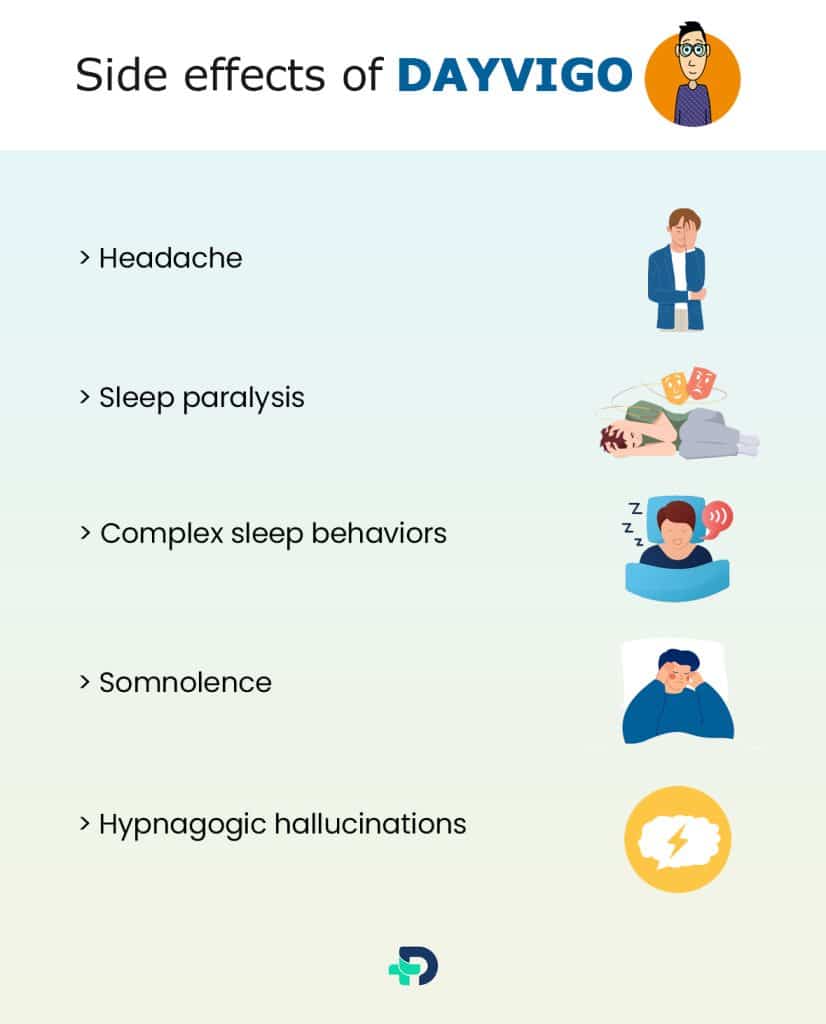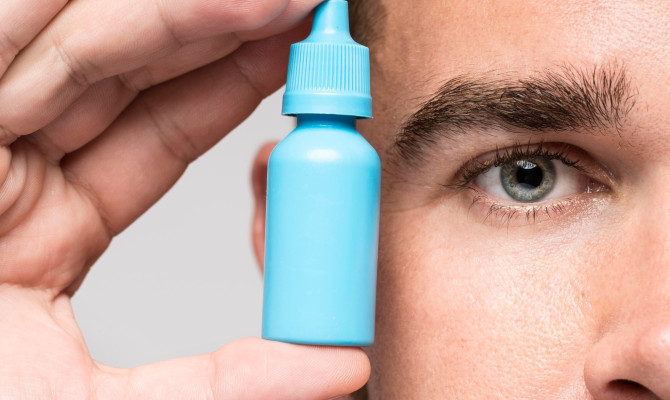Dayvigo: Uses, Side effects and Interactions

- Dayvigo
- 17 Aug 2023
Overview
What is Dayvigo?
Dayvigo belongs to a group of medicines called orexin receptor antagonists (a class of drugs that helps to regulate transitions between wakefulness and sleep) which is used to treat insomnia (a sleep disorder), characterized by symptoms such as difficulties with sleep onset and/or sleep maintenance in adult patients.1Overview| Researched based study from Fda.gov

Uses
Why is Dayvigo used?
Dayvigo is used to treat insomnia
- Insomnia is a common sleeping problem. If you have it, you may struggle to fall asleep, stay asleep, or experience both difficulties. As a result, you might get poor-quality sleep or too little sleep which might make you feel unrest/exhausted when you wake up.2Uses| Researched based study from Medlineplus.gov
Dayvigo mechanism of action
- Dayvigo focuses on the pathway thought to control wakefulness in the brain.
- Acting as an orexin receptor antagonist, it helps to cure insomnia by blocking orexin signals in the brain known to be involved in wakefulness
- This medication is said to aid patients in falling asleep and staying asleep throughout the night3Uses| Researched based study from Nlm.nih.gov
Side effects

Side effects of Dayvigo
If any of these signs are bothersome or do not go away, consult your physician for guidance:
Common side effects:
- Somnolence
- Headache
- Nightmare/abnormal dreams.
Uncommon/infrequent side effects
- Sleep paralysis (a period of time during which one is unable to speak/move for several minutes)
- Hypnagogic hallucinations (hallucinations that happen when you’re sleeping).
Serious side effects (that lead to discontinuation of treatment with Dayvigo)
- Complex sleep behaviors 4Side effects| Researched based study from Tga.gov.au
Complex sleep behavior
- Complex sleep behavior is a sleep disorder in which you encounter unwanted physical occurrences or experiences that keep you awake from sleeping.
- Complex sleep behaviors may develop after using Dayvigo for the first time or in the future, with or without concurrent use of alcohol or other CNS depressants. If this happens, Dayvigo should be stopped right away5Side effects| Researched based study from Clevelandclinic.org
Precautions
Warnings and precautions
Inform your doctor if you experience the following effects:
- Daytime impairment (due to concurrent use of CNS depressants)
- Drug Abuse and dependence
- Hypnagogic hallucinations and sleep paralysis
Daytime impairment
- Dayvigo as other sleep promoting medicines impairs daytime wakefulness. The risk of daytime wakefulness is generally increased when Dayvigo is taken less than a full night sleep remaining or when a higher dose is taken.
- When CNS depressants (such as benzodiazepines, tricyclic antidepressants, and alcohol) is concomitantly used with Dayvigo, the risk of daytime impairment increases which on occurrence should be stopped or have a dose modification as per doctor’s advice.
Abuse and dependence
- The danger of somnolence, daytime sleepiness, slower reaction times, and/or a diminished ability to drive safely rises when Dayvigo is misused.
- Dayvigo users who use it for a long time, have a history of drug abuse, or mix it with alcohol or other drugs are all at risk for abuse. The extended administration of Dayvigo did not result in any withdrawal signs or symptoms once the drug was withdrawn, according to animal research and clinical trials.
Hypnagogic hallucinations and sleep paralysis
- When using Dayvigo, it is possible to experience hypnagogic hallucinations, which include vivid and unsettling perceptions, as well as sleep paralysis. Hence, while administering Dayvigo, doctors should inform their patients of the nature of these incidents.
Contraindications
Dayvigo Contraindications
Dayvigo is not recommended for use if you suffer from the following conditions:
- Severe hepatic impairment (liver failure)
- Alcoholism
- Narcolepsy (excessive uncontrollable daytime sleepiness)
- Hypersensitive/allergic to Lemborexant.4Contraindications| Researched based study from Tga.gov.au
Use with particular populations
Pregnant women
- Dayvigo should only be used during pregnancy if the potential advantages outweigh the potential hazards to the fetus, as the safety and effectiveness of medication use in expecting mothers have not been demonstrated.
Nursing mothers
- Due to the uncertainty surrounding the drug’s ability to cross into breast milk, Dayvigo is not advised for use by women who are nursing.
Patients with Compromised respiratory function:
- Patients with moderate to severe chronic obstructive pulmonary disease/obstructive sleep apnea have not been studied with Dayvigo who are typically recommended to use caution while using the medication to prevent side effects.
Individuals with renal impairment:
- Dayvigo administration does not require a dose change for patients with mild, moderate, or severe renal impairment. Consult your doctor before using the medication to avoid any negative side effects.
Individuals with hepatic impairment
- Dayvigo should not be taken by anyone who has severe hepatic impairment. It must be provided carefully to those who have mild hepatic impairment. To prevent any unfavorable side effects, discuss the drug with your doctor prior to use.
Use in children
- Dayvigo is not advised for use in children or teenagers (under the age of 18), since the safety and effectiveness of drug use in this age group has not been demonstrated. For additional advice, speak to your doctor.
Geriatric patients
- Elderly patients (65 years of age and older) should use Dayvigo cautiously and only after seeing a doctor to prevent side effects.4Contraindications| Researched based study from Tga.gov.au
Interactions
Dayvigo interactions
Drug interaction
A lot of drugs can interact with Dayvigo, and some drugs shouldn’t be taken at the same time. Please let your doctor know about all other medications you are taking. This covers prescription and OTC medications as well as vitamins and herbal supplements.
CYP3A Inhibitors (medicines that increase the risk of Dayvigo adverse reactions)
- Avoid concomitant use of Dayvigo with strong/moderate CYP3A inhibitors (Ex. itraconazole, clarithromycin/fluconazole, verapamil)
CYP3A Inducers (medicines that decrease the efficacy of Dayvigo medication)
- Avoid concomitant use of Dayvigo with strong/moderate CYP3A inducers (rifampin, carbamazepine/bosentan, efavirenz).
Interaction with Alcohol
- Patients should be warned not to consume alcohol while taking Dayvigo medication since it could raise the chance of CNS depression (resulting in daytime impairment), and/or complex sleep behaviors (that includes sleep-walking, sleep-driving, and/or performing other tasks while not completely awake).4Interactions| Researched based study from Tga.gov.au
Takeaway
Takeaway tips
- Medicines are prescribed for specific purposes. Do not use Dayvigo other than the prescribed use.
- Even if they exhibit the same symptoms as you, avoid giving Dayvigo to others because it could hurt them.
- Keep Dayvigo medicine out of the reach of children
- Dayvigo can be stored at room temperature
- After taking Dayvigo, avoid driving or operating machines until you feel better/fully awake
- The common side effect associated with the use of Dayvigo is sleepiness. Consult your doctor if any serious side effects occur after taking the medicine.
Any feedback on this article?
 This Articles content was accurate
This Articles content was accurate Very Informative Article
Very Informative Article I have a question or a comment
I have a question or a comment
 This article contains inaccurate content
This article contains inaccurate content This article was not helpful
This article was not helpful I have a question or a comment
I have a question or a comment
We appreciate your helpful feedback!
Checkout our social pages
References
-
U.S FOOD AND DRUG ADMINISTRATION
DAYVIGOTM (lemborexant) tablets, for oral use | Overview
-
Medline Plus
Insomnia | Uses
-
National Library of Medicine
Lemborexant | Uses
-
Therapeutic Goods Administration
DAYVIGO® (LEMBOREXANT) FILM COATED TABLETS | Side effects | Contraindications | Precautions
-
Cleveland Clinic
Parasomnias & Disruptive Sleep Disorders | Side effects





































